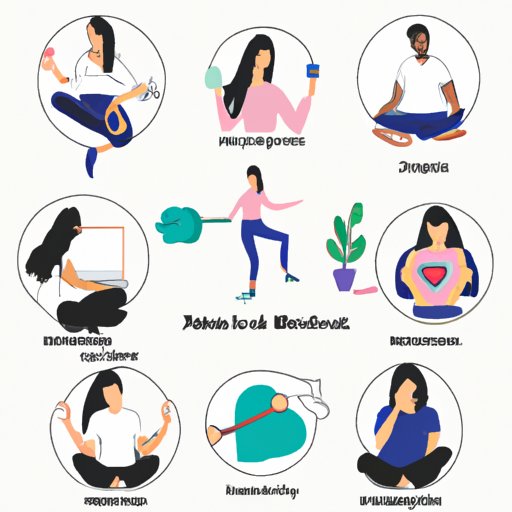Introduction
Mental health is a critical component of overall wellbeing. It has been defined by the World Health Organization (WHO) as “a state of well-being in which every individual realizes his or her own potential, can cope with the normal stresses of life, can work productively and fruitfully, and is able to make a contribution to her or his community.” Unfortunately, many people struggle with their mental health, which can lead to feelings of sadness, loneliness, and anxiety. Therefore, it is important to take steps to improve your mental health.
Exercise Regularly
Regular physical activity is one of the most effective ways to improve your mental health. Studies show that aerobic exercise can reduce symptoms of depression and improve moods. Exercise also releases endorphins, which are hormones that promote positive feelings. Additionally, regular physical activity can help reduce stress, increase self-esteem, and improve cognitive functioning.
To incorporate exercise into your life, start by setting realistic goals. For example, aim for 30 minutes of moderate-intensity activity five days a week. You don’t have to go to the gym; there are plenty of activities you can do at home, such as yoga, jogging, or even walking around the block. Find something you enjoy and stick with it.
Practice Mindfulness and Meditation
Mindfulness and meditation are powerful tools for improving mental health. Mindfulness involves paying attention to the present moment without judgment. This can help reduce stress and anxiety, as well as improve focus and concentration. Meditation, on the other hand, involves focusing on the breath and letting go of distracting thoughts. Research has shown that both mindfulness and meditation can improve mood, reduce rumination, and increase self-awareness.
If you’re new to mindfulness and meditation, it’s best to start small. Begin by taking just 10 minutes a day to sit in silence and focus on your breath. As you get more comfortable, you can increase the length of your practice and explore different techniques, such as guided meditations or body scans. There are also plenty of apps available to help you get started.
Get Quality Sleep
Quality sleep is essential for mental health. Studies have shown that lack of sleep can lead to decreased cognitive performance, increased stress, and impaired memory. On the other hand, getting enough restful sleep can improve energy levels, boost mood, and enhance focus. Therefore, it is important to prioritize getting quality sleep.
To ensure you get enough restful sleep, create a consistent bedtime routine. Avoid screens at least an hour before bedtime and establish a relaxing ritual to help you wind down. Additionally, try to go to bed and wake up at the same time each day to regulate your sleep-wake cycle. If you’re still having trouble sleeping, consider speaking to your doctor about possible solutions.
Establish Healthy Eating Habits
Healthy eating habits are key to improving mental health. Certain foods, such as those high in omega-3 fatty acids, can reduce symptoms of depression and anxiety. Eating a balanced diet that includes whole grains, fruits, vegetables, lean proteins, and healthy fats can also help you maintain a healthy weight, which is important for physical and mental wellbeing.
Start by making small changes to your diet, such as replacing sugary snacks with fruits or adding an extra serving of vegetables to each meal. Make sure to drink plenty of water throughout the day and limit processed and packaged foods. Lastly, try to cook at home as much as possible, as this will give you more control over what you eat.
Connect with Others
Connecting with others is an important part of maintaining good mental health. Social connections provide support, reduce stress, and increase happiness. They can also help prevent loneliness and isolation, which can worsen mental health conditions.
To connect with others, set aside time in your schedule to call, text, or meet up with friends and family. If you’re feeling shy or uncomfortable, start by joining a club or organization related to a hobby you enjoy. You can also use social media to stay connected with people who share similar interests. Finally, don’t forget to be kind and supportive of those around you.
Seek Professional Help
It’s important to remember that professional help is always available if you need it. Seeing a therapist or counselor can be beneficial for managing mental health issues, such as anxiety or depression. A mental health professional can provide advice, support, and guidance to help you cope with difficult emotions and situations. Additionally, they can help you develop healthy coping mechanisms and foster a sense of self-awareness.
If you’re looking for a mental health professional, start by asking your primary care physician for recommendations. You can also search online for therapists in your area. Don’t be afraid to ask questions and make sure you find someone you feel comfortable talking to. Remember, you don’t have to go through this alone.
Conclusion
Mental health is an important factor in overall wellbeing. To improve your mental health, it is important to exercise regularly, practice mindfulness and meditation, get quality sleep, establish healthy eating habits, connect with others, and seek professional help when needed. By taking these steps, you can take control of your mental health and build a strong foundation for a happier and healthier life.
(Note: Is this article not meeting your expectations? Do you have knowledge or insights to share? Unlock new opportunities and expand your reach by joining our authors team. Click Registration to join us and share your expertise with our readers.)
